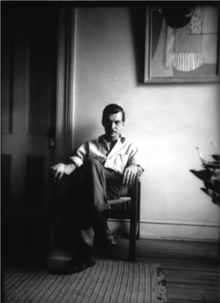Weldon Kees
| Weldon Kees | |
|---|---|
 |
|
| Born | Harry Weldon Kees February 24, 1914 Beatrice, Nebraska, United States |
| Died | July 18, 1955 (aged 41) San Francisco, California |
| Occupation | Poet, painter, musician, filmmaker |
| Nationality | American |
| Alma mater | University of Nebraska |
| Period | 1934–1955 |
| Literary movement | American poetry |
| Notable works | The Collected Poems of Weldon Kees, Fall Quarter, The Ceremony and other stories |
Harry Weldon Kees (February 24, 1914 – July 18, 1955) was an American poet, painter, literary critic, novelist, playwright, jazz pianist, short story writer, and filmmaker. Despite his brief career, he is considered an important mid-twentieth-century poet of the same generation as John Berryman, Elizabeth Bishop, and Robert Lowell. His work has been immensely influential on subsequent generations of poets writing in English and other languages and his collected poems have been included in many anthologies. Harold Bloom lists the publication of Kees's first book The Last Man (1943) as an important event in the chronology of his textbook Modern American Poetry as well as a book worthy of his Western Canon.
He is a poet of remarkable totality of approach toward the world and his very self. Behind his irate dismissal of both, one discerns a fierce Calvinist spirit; one sees a man summoning his epoch and himself to his own last judgment and finding no argument in either's defense, and, naturally, no grace. He does this with relish and with savage irony. How is it, one may wonder, that a boy from Nebraska turned into this merciless, supreme agonist? —Joseph Brodsky
Kees was born in Beatrice, Nebraska, to John Kees, a hardware manufacturer, and Sarah Green Kees, a schoolteacher. The Kees family was well-to-do, John Kees being part owner of F.D. Kees Manufacturing Co., which patented and produced corn-husking hooks as well as innovative products such as a window defroster for automobiles and a moving lawn sprinkler that resembled a farm tractor. Weldon Kees was a precocious child whose playmates included Robert Taylor and whose pastimes included producing his own magazines, giving puppet shows and even acting. He was treated like a small adult by his parents, whom he addressed by their first names.
...
Wikipedia
